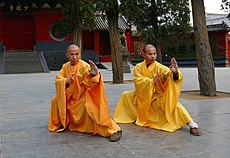Shifu
| Shifu | |
|---|---|
Hanyu Pinyin | Shīfù |
| Yue: Cantonese | |
| Jyutping | Si1 fu3-2 |
| Sidney Lau | Sifu |
| Part of a series on |
| Chinese martial arts (Wushu) |
|---|
 |
Shifu is a Chinese title meaning "skilled person", "teacher", or "master" that is most often used in English to address a teacher of Chinese martial arts. It is also romanized as sifu from Cantonese or sai hu from Hokkien.
Etymology
"Shifu" is in fact the
Shifu (师傅; shīfù) was historically associated with skilled manual labor. During the Cultural Revolution, it grew dramatically in popularity and was used as a term of address for any stranger, even replacing the Chinese word for "comrade" (同志; tóngzhì). However, in the decades since, manual labor no longer has the same place of high respect as it did. Shifu is therefore less widely accepted, especially among white-collar workers.[4]
Use in martial arts
This section needs additional citations for verification. (August 2014) |
Traditionally, in Chinese martial arts shifu was used as a familial term and sign of respect as in the general usage. A shifu was deemed a "father", therefore his disciples would address each other as "brothers" or "sisters", particularly "big brothers" (師兄; shīxiōng), "little brothers" (師弟; shīdì), "big sisters" (師姐; shījiě) and "little sisters" (師妹; shīmèi). More specific familial prefixes could also be used, for example as in "biggest brother" (大師兄; dàshīxiōng), "second biggest (big) sister" (二師姐; èrshījiě), "third biggest (little) sister" (三師妹; sānshīmèi). Unlike actual familial prefixes however, dà-, èr-, sān-, etc. usually depended on the order in which a disciple was officially adopted by the master (i.e. seniority), not on their age. Likewise, whether or not fellow disciples are addressed as "big" or "little" brother/sister depended on whether they were adopted by the master before or after the subject, not on whether or not they are actually older or younger in age.
Despite the "father" meaning of the word 父, the term 師父/师父 is also used to address a female teacher, while the term shīmǔ (師母/师母) or "master-mother" is used to address a male teacher's wife. A female teacher's husband is addressed as shīzhàng (師丈/师丈) or "master-husband".
Additionally, there are also terms for the master's fellow disciples, such as "big uncle" (師伯) or "little uncle" (師叔), which also apply regardless of sex. Whether or not they are addressed as "big uncle" or "little uncle" also depends on when that person was adopted by the master's master, not their age.
The term takes on a less intimate context when a student becomes a formal student or disciple of the teacher. The acceptance as a student is a very formal event, usually requiring a discipleship ceremony called bai shi (拜師/拜师).[5] After the ceremony, the relationship is defined in a more direct parent–child context and usage takes on this term rather than a generic sign of respect for skill and knowledge.
See also
- Duan wei (ranks in Chinese martial arts)
- Fashi: Masters of Rites in Chinese ritual mastery traditions
- Master Shifu, character in Kung Fu Panda
- Burmese: Sayadaw
- Japanese: sensei
- Sanskrit: guru
- Thai: Ajahn
- Tibetan: Lama
References
- ^ a b Yu, Chunli; Mansor, Nor Shahila; Ang, Lay Hoon; Sharmini, Sharon (2022). "Chinese Address Terms "Shifu" (师傅) vs. "Shifu" (师父): A Comparative and Diachronic Study Based on the BCC Corpus". Hong Kong Journal of Social Sciences. 60.
- ^ Kubler, Cornelius (2011). Basic Spoken Chinese: An Introduction to Speaking and Listening for Beginners, Volume 1. North Clarendon, VT: Tuttle. p. 304. Retrieved 9 August 2023.
- ^ Sheu, Hsiu-Chih (2018). "Language Learning Strategies and Intercultural Competence in the Year Abroad Study in China". In Härkönen, Anu; Dervin, Fred; Du, Xiangyun (eds.). International Students in China: Education, Student Life and Intercultural Encounters. Springer International Publishing. pp. 213–214.
- . Retrieved 9 August 2023.
- ^ Crescione, John. "Bai Si – Art of the Disciple". Archived from the original on 4 March 2016. Retrieved 10 February 2014.
External links
 The dictionary definition of shifu at Wiktionary
The dictionary definition of shifu at Wiktionary
